Yesterday, I began my look at the two big comic book companies’ future movie plans with a look at Marvel. I think, at this point, the only thing you can really call Marvel’s attempt at creating one cohesive television/movie universe is a big success. Well, more like a giant success. With GOTG being the major blockbuster it was last year, it became apparent that Marvel can do no wrong (as long as you forget Iron Man 2). They are the reigning champs, and it doesn’t look like they are looking to give up that title any time soon. Avengers: Age of Ultron looks amazing, and somehow, Ant-Man is picking up steam. DC has only put one movie out there as part of their cinematic universe, and that was a couple of years ago. It will have been 3 years by the time the next one, Dawn of Justice, comes out. By comparison, in that same span of time, Marvel will have released 7 films total. 7. It almost seems like DC isn’t even trying.
That’s not totally true. The idea for DC to put together their own universe like Marvel’s has been around for a while, but they just haven’t been able to get it off the ground. The original plan was to launch the DC universe with Green Lantern (2011), and begin building from there. Unfortunately, we all saw Green Lantern and it was just painful. That put the stop on the whole one universe, Justice League idea for a while. DC started going in a different direction, called TV, as it launched Arrow. The series became a hit, leading to a spinoff series, The Flash. These two series, however, were not attached to the Green Lantern film. Or to the Nolan Batman trilogy, which was also not connected to the Green Lantern film. Leaving DC with three different universes in which their heroes now resided. Enter Man of Steel (2013). This introduces yet another universe, and DC’s first hit movie of this century not starring Batman. In the time between 2011 and 2013, it became apparent that Marvel’s whole plan is coming together nicely, and with MOS’s success, DC revisits the idea of creating one big universe where all their heroes can reside. They decide to go for it, but they still take a different approach, as Geoff Johns refers to their productions as being part of a Multiverse, instead of a universe. Oh bother, DC.
What is it?
Basically, it was DC is calling their upcoming productions, both Films and TV shows. Marvel had their catchy “Marvel Cinematic Universe,” so DC had to come up with something catchy to compete. Hence, the DC Multiverse. Think of it as being similar to when DC started their “New 52” in the comics, so Marvel had to respond with “Marvel NOW!” The good news for comic book fans is that both companies have kept both stupid monikers going for way to long. (What is the rule for how long something can be called “New”?) To be fair, DC isn’t just trying to come up with a clever name. They are also trying to cleverly sidestep a major issue. They don’t want to tie in Arrow and The Flash with their upcoming films. They want them to be totally separate. So, because fans eat this stuff up, they have decided that DC will have a multiverse in their Television/Cinematic world just like they have in the comics. In other words, don’t expect to see Stephen Amell or Grant Gustin sharing the screen with Ben Affleck and Henry Cavill. In fact, they have already cast Ezra Miller to play the role of the Flash in the Justice league and Flash movies. No special appearances by the heroes in the big movies on the small screen either. It’s just not happening.
Why it Works
It will work for one big reason. We, the fans, want to see it. We finally got to see the Avengers come together, and it was awesome. Now we get to see the two biggest superheroes ever come together for the first time on the big screen. That alone is worth all of it. At least I hope it will be. DC really has an opportunity to make all of this something special, just like Marvel has. Let’s just hope they don’t screw it up. In addition to seeing Batman and Superman together, we will get to see Wonder Woman for the first time on the big screen, as well as the Flash, and of course, everyone’s favorite, Aquaman. DC has so many characters that we have not seen up on the big screen before, so it will make for some exciting, fresh characters.
It will also work, because this model allows DC to do whatever they want on the big screen as well as the little screen. They have a good thing going on Arrow and The Flash, but they aren’t tied to making that world the same for every character. In fact, it seems like Gotham is taking place in another universe as well. The result is, Gotham is not hindered by what’s happening in Arrow or The Flash. The studio doesn’t have to give any explanation for any kind of inconsistencies fans will see when Batman is on the screen in Dawn of Justice and something doesn’t match up to what is happening in Gotham. The studio has already provided us with the answer to any of those questions-it’s a multi-verse.
Why it Doesn’t Work
To be clear, The Flash and Arrow are not reasons why this model does not work. Well, maybe indirectly. More like examples of a potential issue. That issue is that it is going to get confusing. Right now, DC has 3 different universes going: The movie universe, the “Flarrow” universe, and the Gotham universe. Wait, 4. I forgot Constantine. 4 different universes right now. That could potentially grow with other projects that DC has announced, like Titans on TNT and Supergirl for CBS. Both of these series could be set in a different universe. A different universe from the 4 mentioned, and a different universe from each other. That could bring it up to 6 different universes. That is going to be hard to keep track of. Who is in which universe? And who knows about whom, and so on. Maybe the plan is to have a universe for each network that DC has a show on, and then the plan is to have a show on 52 different networks (they seem obsessed with 52). I doubt that is really the plan, but hopefully you get the point. It seems like, at least on TV, there is little to no cohesiveness, and that is kind of lame too. At the very least, keep all the TV properties in one universe and the movie properties in another.
That wraps up my look at the two different models, at least for right now. It is really hard to tell what will happen with DC because we just don’t have enough from them right now to make any kind of judgement. All we can do is speculate on how it will all play out. I am hoping for the best. I am not really interested in who “wins” between the two companies, because in the end,I am hoping I win and we have years and years of quality superhero entertainment coming our way. What are your thoughts on the whole thing? Do you like Marvel’s or DC’s model better? Let us know in the comments.

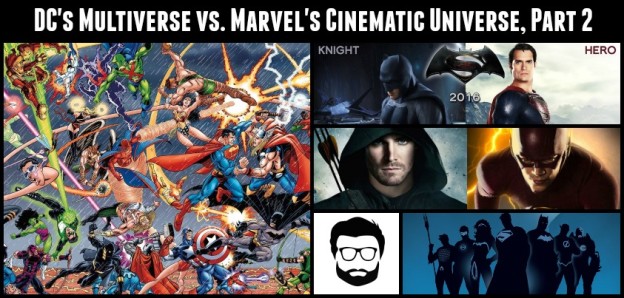
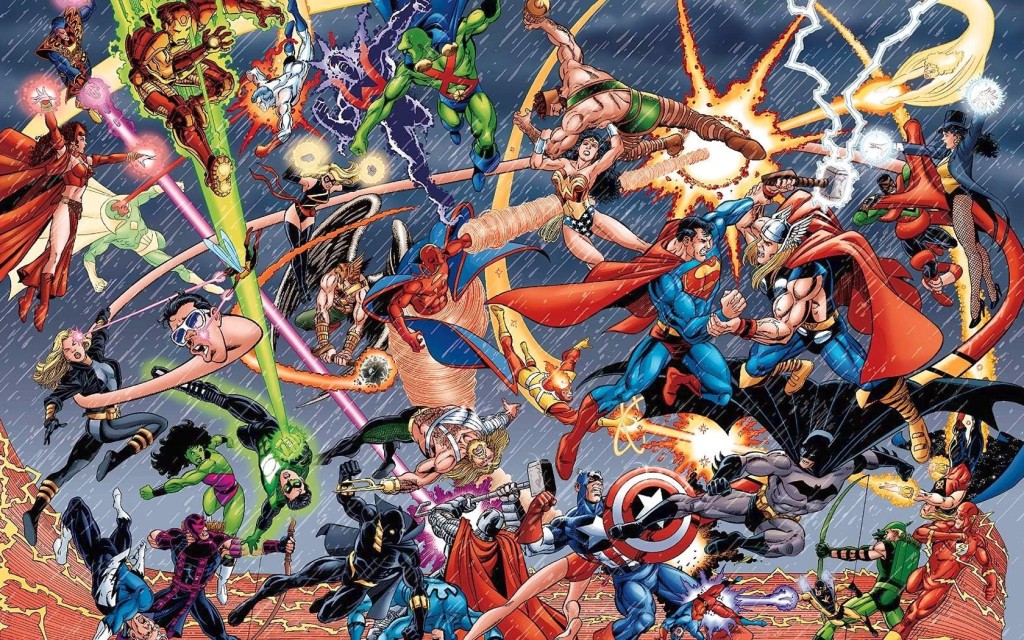
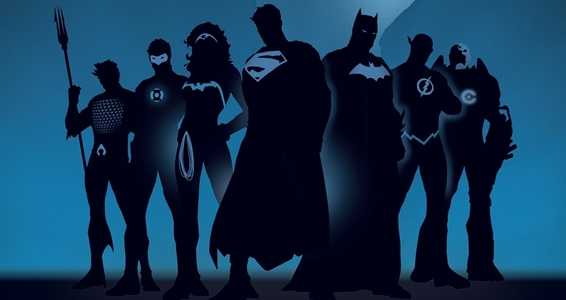
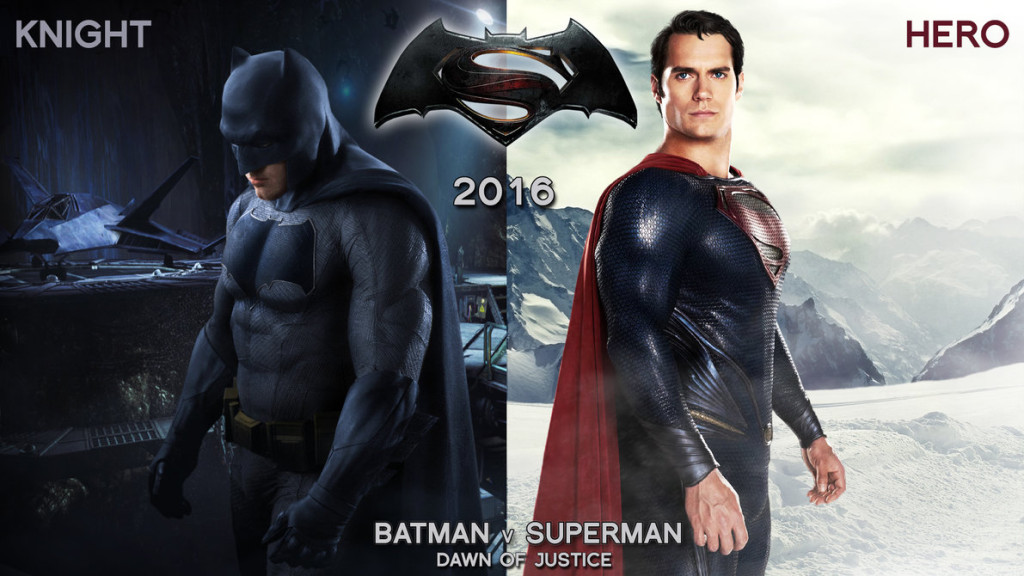
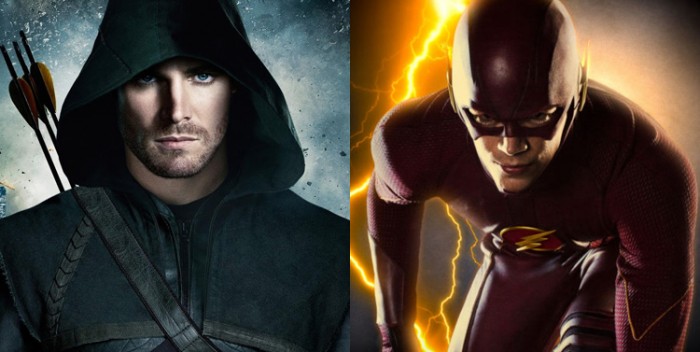
I prefer Marvel’s approach everything is tied together and the chances of awesome crossovers are possible and as Kevin Feige says if the fans want to see it then that is what will give them. While DC’s approach is just throw things out there and see what sticks plus WB is being very restrictive of ARROW and TV FLASH, e.g. you can’t use Harley Quinn on ARROW because she will appear in the SUICIDE SQUAD movie but at the same time you can have two different FLASH’S. WB are really just creating a mess nobody knows what is connected to what, at least when Marvel announced the DAREDEVIL TV series you knew that it was apart of the MCU. I love both Marvel and DC but Marvel just seems to have a better understanding of what they are doing and what they want to achieve.